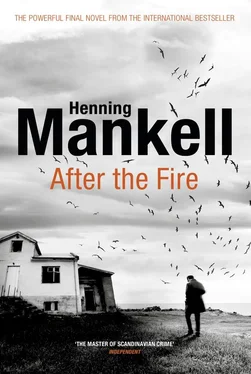The night was chilly as I emerged through the glass doors, looking for the airport bus. However, I immediately changed my mind. Why go to my hotel and sit around in reception until late afternoon, when my room would be available? I went back inside the terminal building and found some empty plastic chairs. I lay down, using my suitcase as a pillow, and soon fell asleep. Unfortunately I woke up every time someone came near me. I had learned the art of dropping off for just a few minutes at a time during the years I spent on call at various hospitals.
It was just after seven o’clock when I sat up. My body was frozen stiff. I had a cup of coffee and a croissant in a cafe that had just opened. The black woman who served me had a noticeable scar down one cheek and part of her ear on the same side was also missing. I wondered which African civil war with its concomitant slaughterhouse she had managed to escape from. Liberia? Rwanda? I smiled at her to show that I understood, but she looked tired; perhaps she was also someone who could no longer trust people.
I sensed so many of the dead behind her. Family, friends, strangers who had not managed to get away, unlike her.
By quarter to eight the airport was beginning to fill up. I went outside and got on a bus showing the Opéra as its final destination. Half the seats were occupied by a large number of Chinese men and women who belonged to a tour group. The group leader moved up and down the aisle, chatting to them. I found a seat right at the back, wondering if I ought to mention that my shirt was made in China.
A black family with an enormous amount of luggage were the last to board before the bus set off with a jolt. The journey into the city centre was drawn out and tedious, with frequent delays. The view from the window was the same as the view in so many other countries. The densely packed traffic induced in me a feeling of despair about the world into which I had been born and in which I happened to live. What were these people, many of them alone in their cars, thinking? Were they thinking at all?
I carried on staring out of the window but decided to ignore the traffic and turn my attention instead to how I was going to track down Louise. My French was far from perfect, but I could usually make myself understood and grasp what others were saying to me.
I got off at the Opéra, which looked almost exactly the same as it had fifty years ago when I saw it for the first time. I had intended to walk to Montparnasse, but after a glance at the Metro map I realised the distance was too great. As a young man I had happily walked from the city centre to the outskirts to visit a flea market, or simply in order to get to know different areas, but now it was too far. I made my way underground and found the line which would take me to Montparnasse, with one change at Châtelet. I remembered that the line going east from Châtelet used to have the most up-to-date trains. Those new trains had rubber wheels that hissed instead of scraping and squealing. I couldn’t get a seat and was squashed up against several women talking to each other in low, intense voices.
By the time I emerged it had started to drizzle, but I knew where I was going. Rue d’Odessa was quite close by, and it took me ten minutes to get to my hotel, during which time I kept having to duck to avoid open umbrellas that threatened to poke me in the eye. It was ten o’clock. I wouldn’t be allowed access to my room for several hours. The brass nameplate did indeed show three stars. The building dated from the end of the nineteenth century and the stone was somewhat crumbling, as if the place was slowly but imperceptibly falling down. The main door was up a short flight of steps, and an African girl was busy cleaning the glass with the name of the hotel etched upon it. She smiled and opened the door for me.
The compact reception area, adorned with brown wallpaper and wooden panelling, smelled of lavender. A thick, worn rug covered the floor. It was dark red, with a motif of smiling mermaids woven into it. A man was standing behind the counter, looking at me with what I perceived to be an odd expression. Then I realised he had a glass eye, just like Oslovski.
I produced my credit card and my temporary passport, and told him in halting French that I had a room booked. He immediately found my name on his computer screen and said that a different card had been used to secure the booking. I explained that this was my wife’s card, but that I wanted him to use the one I had just handed over.
‘Will I be able to get into the room at two o’clock?’ I asked.
The receptionist wore a name badge announcing that he was Monsieur Pierre. His expression was friendly as he said, ‘You can go up now. We had a guest who left very early, poor man — at half past four.’
He nodded in the direction of the black girl who was still polishing the glass door.
‘Rachel has already cleaned your room.’
He took down an old, heavy key with the number 213, pointed towards the lift and bade me welcome.
My room overlooked a courtyard at the back. Just as in the reception area, everything was in shades of brown, and once again there was the scent of lavender. The place wasn’t large, but Rachel had done her job well. I took off my shoes, folded back the bedspread and lay down. I gazed up at the ceiling, where a network of thin black cracks extended across a white background.
The ceiling was like a fog that was beginning to lift.
I took out my phone and tried Louise’s number once again. Still no answer, still no possibility of leaving a message.
I thought about the ruins of my house. About the tent out on the skerry, used by some unknown person.
And now room 213.
I remembered what Louise had told me about the Japanese garden known as the Ocean of Emptiness.
Suddenly there was just one thought in my head. I didn’t want to die of a heart attack or a stroke in this hotel room. Not before I had found my daughter. I sat up; I had to start searching for her. I went over to the window; it was raining harder now.
I caught a glimpse of a rat disappearing among the rubbish bins.
I left the room. The lift was busy and didn’t arrive even though I pressed the button several times. I met Rachel on the stairs, carrying a pile of clean sheets. She smiled at me again, and I thanked her for cleaning my room so well. I gave her a five-euro note and carried on down the stairs.
When I glanced over my shoulder, she was standing there watching me.
In reception I asked Monsieur Pierre if I could borrow the Paris telephone directories. He immediately offered to look up the number I wanted on his computer, but I declined; I didn’t want to tell him that I was going to make a list of all the prisons and police stations in the city.
He gave me the heavy directories; I also asked him for a pen and some paper, then settled down in the closed bar. I spent almost an hour jotting down addresses and phone numbers. I also found the name of the prison where I had spent an afternoon, a night and several hours the following morning in the spring of 1968.
I had realised that my visit coincided with the student riots only when I was looking for cheap accommodation around the Latin Quarter. I ended up right in the middle of utter chaos — burning cars, tear gas, riot police, a boiling sea of people. Of course I was aware of the student movement in Europe, but I had never been a part of it. I had just started training to be a doctor and never joined in the political discussions over lunch or at break time. I distrusted those who became doctors in order to travel to poor countries. I wanted to be a doctor so that I could earn a good salary and have the freedom to choose where I worked. The thought of going off to Africa or Asia was complete anathema to me. I regarded my colleagues who were contemplating such a course of action as naive; I had no doubt that they would change their minds or regret their decision. Today I think I was probably wrong.
Читать дальше












